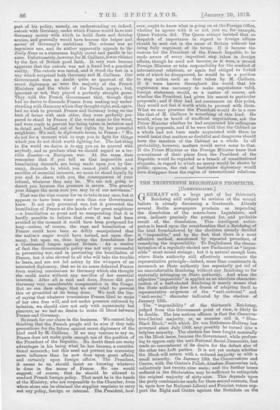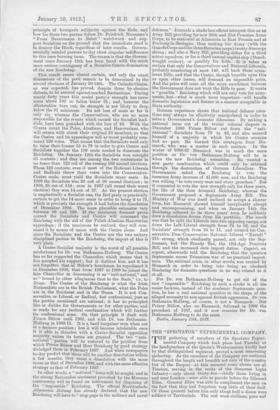TILL THIRTEENTH REICHSTAG'S PROSPECTS. [COMMUNICATED.] G ERMANY with a large part
of her thirteenth Reichstag still subject to revision at the second ballots is already discussing a fourteenth. Already several Berlin newspapers proclaim as impending the dissolution of the scarce-born Legislature, and even indicate precisely the pretext for, and probable result of, the dissolution. This intelligent antici- pation is based upon the consideration that a Reichstag of the kind foreshadowed by the elections already decided is " impossible," and by the fact that there is a most effective method, sanctioned by repeated precedent, of remedying the impossibility. To Englishmen the charac- terization of a regularly elected new Parliament as " impos- sible" must sound strange ; but it is natural enough here, where State authority still effectively counteracts the representative principle—indeed, more than counteracts it, inasmuch as State authority has repeatedly got rid of an uncomfortable Reichstag without any Reichstag so far materially infringing on State authority. And when the adjective impossible" is applied as an absolute character- ization of a half-elected Reichstag it merely means that the State authority does not dream of adapting itself to representative exigences of the " anti-national" and " anti-social " character indicated by the election of January 12th. The " impossibility" of the thirteenth Reichstag, judged from this Government point of view, is likely to be double. The less serious offence is that the- Conserva. tive-Clerical majority, or, as enemies call it, " Blue- Black Block," with which Dr. von Bethmann-Hollweg has governed since July 1909, may possibly be turned into a helpless minority. The election has been fought nominally on the Block issue, because the Government, while profess- ing to oppose only the anti-National Social-Democrats, has made no concealment of its desire for the defeat also of the other two Left parties. It is not yet certain whether the Block will return with a reduced majority or with a small minority. On January 12th the Conservatives and Centre, with the Centre's Polish-Alsatian-Hanoverian tail, collectively lost twenty-nine seats; and the further losses suffered in the Stichwahlen may be sufficient to extinguish the original majority of sixty-nine. This depends upon the party combinations made for these second contests, that is, upon how far National-Liberal and Freisinn voters sup- port the Right and Centro against the Socialists on the principle of bourgeois solidarity against the Reds, and how far these two parties follow Dr. Friedrich Naumann's " From Bassermann to Bebel " watchword and sup- port Socialisti on the ground that the immediate need is to destroy the Block, regardless of later results. Govern- mentally minded persons to-day show singular indifference to this once burning issue. The reason is that the Govern- ment since January 12th has been faced with the much more serious contingency of a Socialist-Centre domination of the new Reichstag.
This result seems almost certain, and only the exact dimensions of, the peril remain to be determined by the second elections of January 20-24th. The Catholic Centre, as was expected, has proved, despite three by-election defeats, to be assured against marked. fluctuations. During nearly forty years this model party's strength has never risen above 106 or fallen below 91; and, however the Stichwahlen, turn out, its strength is not likely to drop below the 91 minimum. Its net loss of seats so far is only six, whereas the Conservatives, who are no more responsible for the events which caused the Socialist land- slide, have been punished with the loss of 22. With the Centre count the Poles, Alsatians, and Hanoverians, who will return with about their original 28 members, so that the Centre and its appendages will at worst probably com- mand 120 -votes. That means that the Socialists need only to raise their former 53 to 79 in order to give Centre and Socialists together the 199 seats needed to dominate the Reichstag. On January 12th the Socialists won outright 65 contests ; and they are among the two contestants in no fewer than 122 out of the coming 189 second elections. These 122 contests, even if most of the National-Liberals and Radicals throw their votes into the Conservative- Centre scale, must yield the Socialists many seats. In 1898 the Socialists won 28 out of 98 second elections ; in 1903, 25 out of 118 ; even in 1907 (all round their worst election) they won 14 out of 87. As the present election is emphatically a Socialist one, the Red party is practically certain to get the 14 more seats in order to bring it to 79, which is precisely the strength it had before the dissolution of December 1906. The more plausible estimates vary between 90 and 120. If the minimum forecast prove correct the Socialists and Centre will command. the Reichstag with the aid of the Polish-Alsatian-Hanoverian appendage ; if the maximum be realized, they will com- mand it by means of union with the Centre alone. And since the Socialists and the Centre aro the two unitary disciplined parties in the Reichstag, the import of this is very plain.
A Centre-Socialist majority is the worst of all possible misfortunes for Dr. von Bethmann-Hollweg. The Centre has so far supported the Chancellor, which means that it has accepted his support ; but it dislikes him, and it has not forgotten that as Billow's henchman he repudiated it in December 1906, that from 1907 to 1909 he joined the late Chancellor in denouncing it as " anti-national," and as " bound by other allegiances than to the State," i.e., to Rome. The Centre of the Reichstag is what the Irish Nationalists are in the British Parliament, what the Poles are in the Reichsrat and in the Durum. It is not Con- servative, or Liberal, or Radical, but confessional, just as the parties mentioned are national; it has no principled like or dislike for Governments or for other parties, and is ready for any tactical combination which will further its confessional aims. On that principle it dealt with Prince Billow until 1906, and with Dr. von Bethmann- Hollweg in 1909-11. It is a hard bargainer even when not in a decisive position ; but it will become intolerable once it is able to threaten with a Centre-Socialist opposition majority unless its terms are granted. The two " anti- national" parties will be restored to the position from which Prince Billow and Herr Dernburg by good strategy dislodged them in February 1907. And when newspapers to-day predict that there will be another dissolution within a few months, they mean a dissolution with the same cause as that of December 1906, and with the same effective strategy as that of February 1907.
In other words, a "national " issue will be sought, and in the strong Nationalist sentiment provoked by the Morocco controversy will be found an instrument for disposing of the " impossible " Reichstag. The official Norddeutsche Allgemeine Zeitung has already declared that the new Reichstag will have to " stop gaps in the military and naval defences." Journals a shade less official interpret this as an Army Bill providing for new 20th and 21st Prussian Army Corps, to be stationed at Allenstein in East Prussia and at Freiburg-in-Breisgau, thus making the Army (with the Guards Corps and the three Bavarian corps) twenty-fivecorps strong ; and also a Navy Bill, providing either for a third active squadron, or for a third annual capital ship (Dread- nought cruiser), or possibly for both. It is taken as certain that only the Conservatives and National-Liberals, probably numbering at most 140, will back these arma- ment Bills, and that the Centre, though buyablo upon this as upon other issues, will demand an impossible price. And the price will seem all the more exorbitant because the Government does not want the Bills to pass. It wants a " possible " Reichstag which will not only vote for arma- ments, but—what is much more important—will handle domestic legislation and finance in a manner acceptable to State authority.
German experience shows that national defence Ques- tions may always be effectively manipulated in order to solve a Government's domestic dilemmas. By making. a national issue out of the trivial colonial dispute in December 1906 Prince Billow cut down the " anti- national " Socialists from 79 to 43, and also assured himself of a majority in which his Centre enemies had no part. He learned this stratagem from Bis- marck, who was a master in such matters. In the winter of 1886-87 Bismarck was in much the same position as Dr. von Beth mann-Hollweg will be in when the new Reichstag assembles. He wanted a now party combination which could only be attained through the destruction of German Liberalism. Tim Government asked the Reichstag to vote the immense Army increase of 41,000 men, and the Reichstag was willing " to vote every man and every groschen." But it consented to vote the new strength only for three years, the life of the then triennial Reichstag, whereas the Government proposed a Septennate Army Bill. The Ministry of War was itself inclined to accept a shorter term, but Bismarck showed himself inexplicably abrupt and uncompromising, and when on January 14th the Reichstag adhered to its three years' term he suddenly drew a dissolution decree from his portfolio. The result was that he split the Liberals into two opposing camps, cut down the Left-Liberal strength from 74 to 32, and the Socialists' strength from 24 to 11, and created his Con- servative-Free - Conservative - National - Liberal " Kartell " 215 strong, which obediently passed, not only the Sep- tennato, but the Brandy Tax, the Old-Age Pensions Bill, and the increased corn import duties. Caprivi, an expert, afterwards told the Reichstag that the question Septennate versus Triennium was of no practical import- ance, The national crisis, in other words, was created by Bismarck in order to bring into being an obedient Reichstag for domestic questions in no way related to it at all.
For Dr. von Bethmann-Hollweg to get rid of the new " impossible " Reichstag by such a stroke is all the easier because, instead of the academic Septennate ques- tion, he has a real national question in the shape of the alleged necessity to arm against British aggression. Dr. von Bethmann-Hollweg, of course, is not a Bismarck. But Prince Billow, also no Bismarck, followed in 1906 the precedent of 1887, and it now remains for Dr. von Bethmann-Hollweg to do the same.
Berlin, January 15th, 1912.











































 Previous page
Previous page